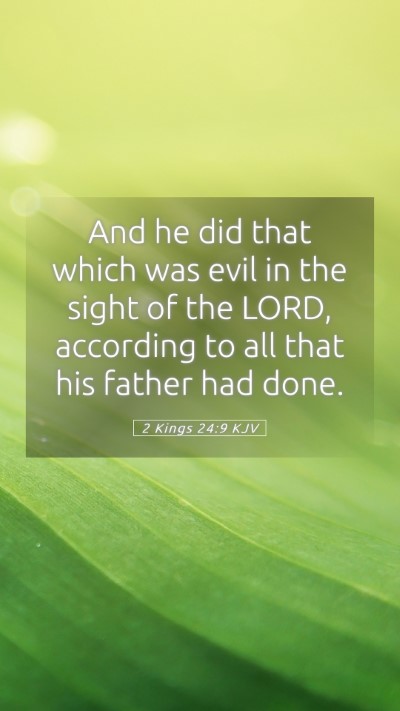Old Testament
Genesis Exodus Leviticus Numbers Deuteronomy Joshua Judges Ruth 1 Samuel 2 Samuel 1 Kings 2 Kings 1 Chronicles 2 Chronicles Ezra Nehemiah Esther Job Psalms Proverbs Ecclesiastes Song of Solomon Isaiah Jeremiah Lamentations Ezekiel Daniel Hosea Joel Amos Obadiah Jonah Micah Nahum Habakkuk Zephaniah Haggai Zechariah Malachi2 Kings 24:9 Meaning
What is the meaning of 2 Kings 24:9?
And he did that which was evil in the sight of the LORD, according to all that his father had done.
2 Kings 24:9 Bible Verse Meaning
Bible Verse Meaning: 2 Kings 24:9
Verse: "And he did that which was evil in the sight of the LORD, according to all that his father had done."
This verse describes King Jehoiachin of Judah, who reigned for a brief period and is evaluated by the biblical author based on his actions and character in relation to God's statutes. The summary of this passage highlights the recurring theme in the Kings narrative about the moral appraisal of rulers.
Analysis and Interpretation
Bible verse meanings: This verse illustrates the consequences of a leader's actions on their nation and emphasizes the importance of righteousness.
- Historical Context: Jehoiachin's reign came during a time of significant turmoil and external pressure from Babylon. His actions directly reflect the spiritual decline of Judah.
- Character Evaluation: The description of Jehoiachin as "doing evil" aligns with the consistent evaluations of kings in 1 and 2 Kings, where wickedness leads to national calamity.
- Contrast with Righteous Kings: By setting Jehoiachin against previous kings who followed God's commands, the text emphasizes the importance of obedience to divine standards.
Insights from Public Domain Commentaries
Matthew Henry's Commentary
Matthew Henry points out that King Jehoiachin's reign exemplifies how the sins of a ruler can have widespread implications for a nation's faithfulness to God.
Albert Barnes' Notes
Albert Barnes emphasizes that this verse marks Jehoiachin's adherence to idolatry, which was inherited from his father's practices. This inheritance of sin showcases the generational cycle of disobedience and its impact on the nation.
Adam Clarke's Commentary
Adam Clarke elaborates on the interpretation of "evil in the sight of the LORD," noting that it refers not merely to moral failings but to a deliberate forsaking of God's covenant, which contributes to spiritual decay in Judah.
Application to Life
This verse serves as a reminder for contemporary readers to evaluate their own leadership—whether in public, private, or spiritual roles—and to act righteously in accordance with God's principles. It invites self-reflection on how an individual's choices can potentially affect a larger community.
Cross References
- 2 Kings 21:20-22: Discusses the evil actions of King Manasseh, which set a precedent for future rulers.
- 2 Chronicles 36:9: Provides supplementary information on Jehoiachin's character and reign.
- Jeremiah 22:24-30: Reflects God's judgment on Jehoiachin and the implications of his reign.
- 1 Kings 15:3: Compares Jehoiachin with other kings, emphasizing the theme of righteousness versus wickedness.
- 2 Kings 23:37: Details the consequences of the kings' actions on the people of Judah.
Conclusion
2 Kings 24:9 serves to highlight the importance of righteous leadership and adherence to divine commands. It functions as a critical piece in understanding the broader narrative of Israel's kings and the consequences of their actions, both individually and nationally.
For those involved in Bible study groups or seeking online Bible study resources, this passage provides essential insights into the significance and application of biblical principles in leadership and community life.


